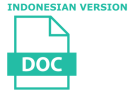- Focus and Scope
- Section Policies
- Peer Review Process
- Publication Frequency
- Open Access Policy
- Archiving
- Publication Ethics
- Screening for Plagiarism
- Digital Archiving
- Statistic Download Article
Focus and Scope
JLA (Jurnal Lingua Applicata) is an open access, peer-reviewed, multidisciplinary journal dedicated to publication in applied languages. JLA focuses on the publication of articles that transcend disciplines and appeal to a diverse readership, advancing the study of languages from the perspective of language acquisition and learning in sociolinguistic contexts. The objective of JLA is to provide comprehensive knowledge of the applicative aspects of languages in its real-life practices, especially in academic and workspace settings.
JLA invites authors to submit research article or book review manuscripts, written in Bahasa Indonesia or English, in the field of applied language studies, including but not limited to English, Japanese, Mandarin, and Korean, as well as Indonesian. JLA encourages innovative methodologies and different perspectives on applied languages to broader views, combining the theoretical and empirical investigation of language use in real-life contexts.
Section Policies
Article In Press
Articles
Book Review
FRONT MATTER
BACK MATTER
Peer Review Process
Every article that goes to the editorial staff will be selected through Initial Review processes by Editorial Board. Then, the articles will be sent to the Mitra Bebestari/ peer reviewer and will go to the next selection by Double Blind Peer Review Process. After that, the articles will be returned to the authors to revise. These processes take a month (four week) for a maximum time. In the each manuscript, peer reviewer will be rated from the substantial and technical aspects. Peer reviewers that collaboration with JLA are the experts in the public administration area and issues around it. They were experienced in the prestigious journal management and publication that was spread around the national and abroad.
Publication Frequency
JLA (Jurnal Lingua Applicata) is issued twice a year, in March and September.
Open Access Policy
This journal provides immediate open access to its content on the principle that making research freely available to the public supports a greater global exchange of knowledge.
All articles published in J. Rek. Pros. are distributed under a Creative Commons Attribution-ShareAlike 4.0 International (CC BY-SA 4.0) license and are immediately open access. We follow the Budapest Open Access Initiative’s (BOAI) definition of open access, meaning readers may freely read, download, copy, print, share, link to the full text of articles, or use them for any other lawful purpose.
Archiving
This journal utilizes the LOCKSS system to create a distributed archiving system among participating libraries and permits those libraries to create permanent archives of the journal for purposes of preservation and restoration. More...
Publication Ethics
As a peer-reviwed journal, this statement clarifies ethical conduct to all parties involved in manuscript publication of JLA (Jurnal Lingua Applicata), including the author(s), editors (editor-in-chief and associate editors), and peer-reviewers. This statement is relied on Practice Guidelines for publication as in Committee on Publication Ethics (COPE’s Best).
In general, all parties should :
- promote fairness and equality and oppose discrimination
- promote the transparency of and respect for the academic record
- respect the confidentiality of others
- be transparent about real or apparent competing interests.
Duties of Authors
Authors should ensure that :
- their work is original and written by them
- their work has not been previously published and has been submitted only to the journal
- where material is taken from other sources (including their own published writing) the source is clearly cited and that where appropriate permission is obtained
- their work does not infringe on any rights of others, including privacy rights and intellectual property rights
- their data is true and not manipulated
- their data is their own or that they have permission to use data reproduced in their paper
- any real or apparent conflicting or competing interest is clearly stated on submission of their paper (this would include funding assistance)
- they adhere to all research ethics guidelines of their discipline, particularly where human or animal subjects are involved
- they contact the Editor to identify and correct any material errors upon discovery, whether prior or subsequent to publication of their work
- authorship of the paper is accurately represented, including ensuring that all individuals credited as authors participated in the actual authorship of the work and that all who participated are credited and have given consent for publication.
Duties of Editors
Editors should:
- maintain and promote consistent ethical policies for their journals
- oversee and act to enforce those policies as needed in a fair and consistent manner
- ensure the confidentiality of the review process
- exercise the highest standards of personality integrity in their work as editor of the journal, recognising and planning for instances where they could have a competing interest or the appearance of a competing interest
- work with authors, reviewers, and Editorial Board members as necessary to ensure they are sufficiently advised regarding their journals’ ethics and publishing policies and that the journal’s stewardship on ethical matters is fair, unbiased, and timely.
Duties of Reviewers
Reviewers must:
- maintain the confidentiality of the review process
- immediately alert their journal editor of any real or potential competing interest that could affect the impartiality of their reviewing and decline to review where appropriate
- conduct themselves fairly and impartially.
Screening for Plagiarism
The manuscript that submitted into this journal will be screened for plagiarism using Turnitin.
Digital Archiving
This journal utilizes the Indonesia One Search (IOS), Indonesian Scientific Journal Database (ISJD), and Indonesian Publication Index (IPI) system to create a distributed archiving system among participating libraries and permits those libraries to create permanent archives of the journal for purposes of preservation and restoration.
Statistic Download Article
Statistic download using ALM Plugin, statistic will be shown on every article page.
ex. https://jurnal.ugm.ac.id/jla/article/view/28280







